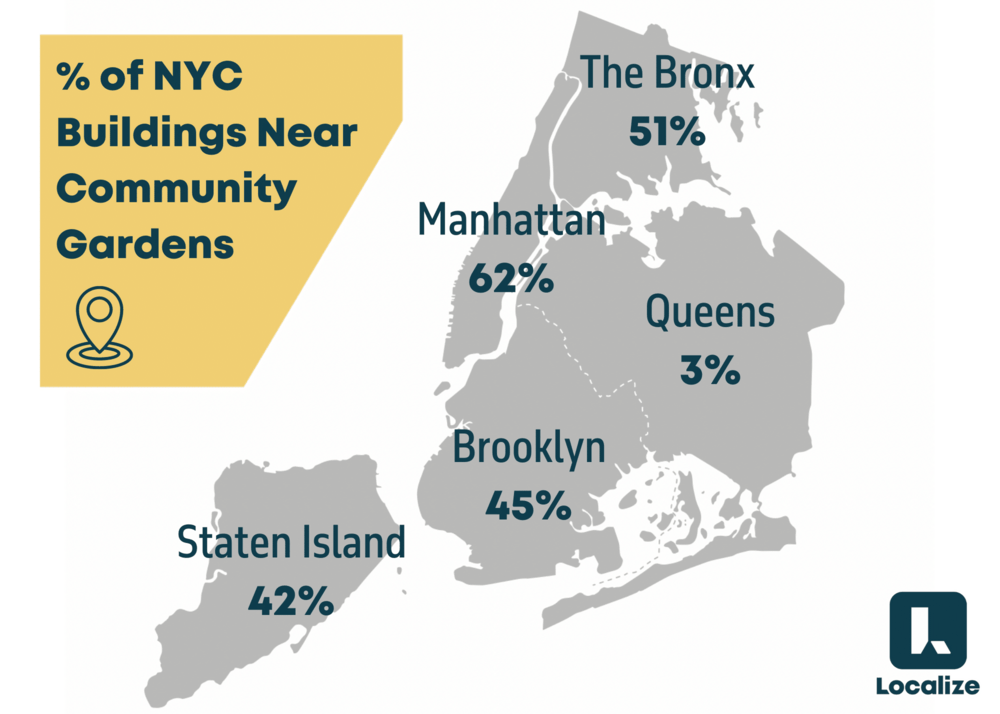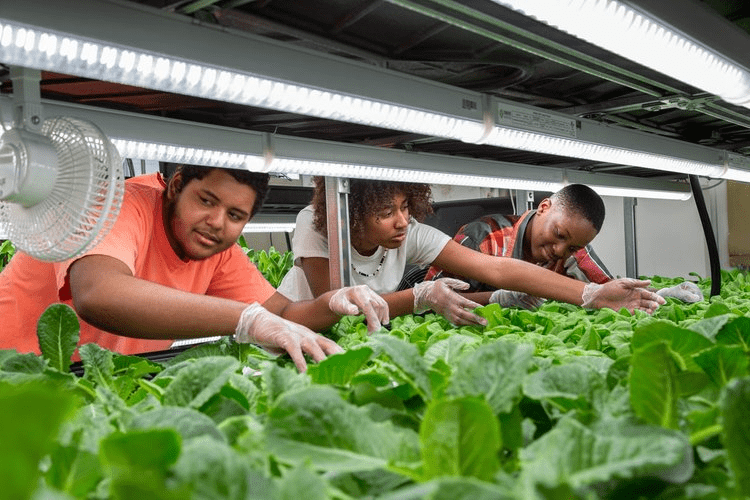May 5, 2022
NYC Councilman Ben Kallos Wants Future Generations To Realize The Power Of Urban Agriculture

Editor’s note: The following information is derived from an interview Agritecture conducted with New York City Council Member Ben Kallos.
New York City has long been considered a leader in both commercial and community examples of urban agriculture.

GreenThumb Garden Map by NYC Parks GreenThumb, City of New York, OpenStreetMap
The City passed its first-ever urban agriculture policy bill in 2017, leading to the development of an urban agriculture resources webpage through the Department of City Planning. Here are a few other measures led by the City to support urban ag-driven food security initiatives:
NYC Parks GreenThumb provides programming and material support to community gardens.
Farms at NYCHA is part of a city-wide partnership designed to improve health outcomes in 12 neighborhoods in NYC.
GrowNYC School Gardens is NYC’s multi-stakeholder school garden initiative to promote and facilitate the creation of sustainable gardens in public schools.
This mission drastically expanded when the City took a critical step forward in ensuring greater food security and access for all its residents.
In October 2021, NYC announced that it would establish an urban agriculture office and an urban agriculture advisory board.
Agritecture had the pleasure of speaking with New York City Council Member Ben Kallos on the significance of this Local Law.

Members of the Urban Farm Corps teach local elementary school students about urban agriculture during the launch of the first NYCHA Farm in Red Hook; image sourced from the New York City Housing Authority
Thinking of the pandemic and the severity of the hits taken by the food system, Councilman Kallos shares that it showed us “how fragile our food network is.” “Whether it was food shortages, toilet paper, paper towels, or groceries whose prices still haven't gone down, New York City simply has to have a more sustainable food supply chain.”
Considering that “more and more, we're seeing that the future of agriculture is urban,” Kallos believes we need to attack the food insecurity crisis by building back better with more urban agriculture and controlled environment agriculture operations.
One NYC-based farm responding to this growing challenge is former Agritecture client Square Roots. This urban farm and accelerator platform empowers entrepreneurs with vertical farming shipping containers.
Agritecture similarly worked with the Child Development Support Corporation, a Brooklyn-based nonprofit operating an emergency food pantry in the Clinton Hill community, setting up a small indoor farm to supplement donated food items with fresh produce grown on-site.
The B Corp Gotham Greens built the city’s first-ever commercial greenhouse farm integrated into a supermarket in 2013. Located atop a Whole Foods Market, this greenhouse continues to supply the supermarket below with fresh and sustainably grown herbs and salad greens, grown using 100% renewable electricity.
The Local Law is said to “expand this important industry and improve the sustainability of our local food production.”
The Office of Urban Agriculture will unite existing commercial farms, community gardens, and public housing to take on this challenge.

Map showcasing the percentage of buildings in each NYC borough that is close to a community garden; map sourced from Localize
The Office will have to “juggle a lot” if it intends to achieve its goal. Councilman Kallos shares that the team will “work with existing commercial farms, trying to expand them, removing barriers to entry across agencies through the lens of social and economic justice.”
With over 550 community gardens, NYC has shown tremendous “opportunity for remediating the soil for community gardens” to “create food relief and additional food” for marginalized communities.
This is particularly essential for public housing residents, a growing challenge in NYC. Councilman Kallos shares that “here in New York City, we have more than half a million people living in public housing. That's more than [the entire population of] Atlanta.” We need to continue to develop such solutions for the people who need them most.
But, we must not forget future generations.
The Office will aim to “work with networks of community gardens like GrowNYC School Gardens.” With more than 725 school gardens registered with the program, “we should be expanding so that these are tools that every child is learning.”

Student farmers at the Green Mountain Energy Sun Club/Teens for Food Justice farm at DeWitt Clinton High School; image sourced from Meg Jones Wall
This was a massive consideration in the new bill: “making sure that there is youth representation on the bill.”
Councilman Kallos himself met with “students at the DeWitt Clinton High School, through Teens For Food Justice, who are producing food that they're eating in their own cafeteria. They’ve harvested 25,000 pounds, donated 30 to 60 pounds to local food pantries, and they even sell at farmers’ markets.”
Through this experience, it was made clear to him that “if we can put this [urban agriculture] in front of our youth as a viable career pathway, there’s incredible potential for our communities.”
For Councilman Kallos, it’s all about advocacy.
He shares that in his district, “we've passed a ban on pesticides in public parks, proposed by kindergarten students. We've passed legislation around LGBTQ health education and GSAs with middle school students.”

One of Teens for Food Justice’s farm; image sourced from Meg Jones Wall
Similarly, this bill “would not have moved forward without Teens For Food Justice. And so, what I would say to everybody out there is: make sure to empower your communities, whether they're kindergartners, teens, or adults. And, to the adults, let the children lead the way. It's important for folks who care about urban agriculture to support their elected officials and get them into positions where they can push through these kinds of changes.”
Councilman Kallos remarks that “people doing the work in urban agriculture haven't felt like they had a seat at the table. This [the office and advisory board] will give them that seat at the table that will give them access to city policy.”
“Agriculture is something that should have no barrier to entry. Farming, which goes back to the dawn of our civilization, should have the lowest, if not zero barriers to entry. But, in urban environments, it is so difficult. I’m hoping that this office can reduce those barriers to entry to zero, and give people the resources they need to start a community garden, a public housing garden, or the next big company that’s going to farm whatever it is that we need here in the city. ”
Here’s what the Agritecture team has to say about this accomplishment.
“The time is now for Cities to incorporate urban agriculture into city-wide services. Creating an urban agriculture office highlights New York City’s commitment to strengthening and building a more robust agricultural ecosystem that will promote economic, social, communal, and environmental benefits for all NYC residents. ”
“As we’ve seen from working with entrepreneurs and city officials around the country, having just one individual within a mayor’s office whose job it is to look out for the best interests of urban farmers, while striving toward measurable long-term outcomes, is a win for both the city and the wellbeing of residents. Trust gets built, partnerships get formed, jobs get created, and the huge gap between supply of and demand for fresh food gets diminished. ”


